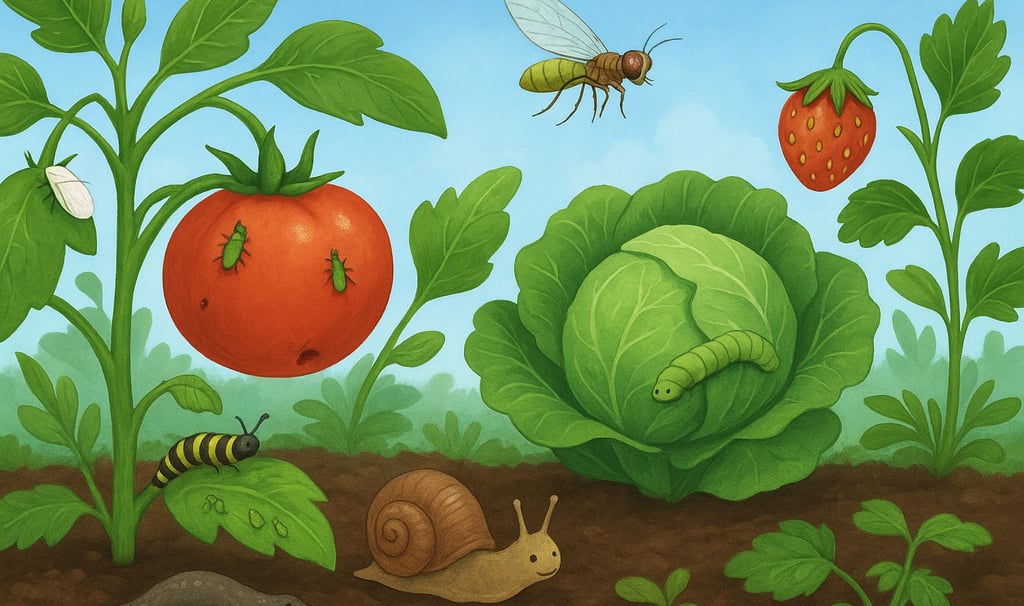🌿 GROWPlantWell – Nurture Nature, Transform Your Space 🌿
Common Garden Insect Pests 🐛 | Identification & Organic Control Tips
Discover the most common garden insect pests 🐜🐞🐛, how to identify them, and organic control methods 🌿 to keep your plants healthy and thriving.
Grow Plant Well
8/18/20253 min read


Gardening is a relaxing and rewarding hobby, but pesky insects can quickly ruin your plants 🌱. Knowing which insects commonly attack gardens and how to manage them is essential for keeping your garden healthy and thriving.
1️⃣ Aphids 🐜
Description:
Tiny, soft-bodied insects that suck sap from plants, causing curled leaves, stunted growth, and sticky honeydew residue.
Common Hosts: Roses 🌹, tomatoes 🍅, beans 🌱, and cucumbers 🥒.
Control Tips:
Spray with a strong stream of water 💦 to knock them off.
Introduce beneficial insects like ladybugs 🐞.
Use neem oil 🌿 or insecticidal soap for severe infestations.
2️⃣ Whiteflies 🕊️
Description:
Small, white flying insects that feed on plant sap and produce honeydew, encouraging mold growth.
Common Hosts: Tomatoes 🍅, peppers 🌶️, and ornamentals 🌺.
Control Tips:
Use yellow sticky traps 🟨.
Spray with neem oil 🌿 or horticultural oil.
Encourage natural predators like lacewings 🦋.
3️⃣ Caterpillars 🐛
Description:
Larvae of butterflies and moths that chew holes in leaves and fruits.
Common Hosts: Cabbage 🥬, broccoli 🥦, tomatoes 🍅, and beans 🌱.
Control Tips:
Handpick caterpillars regularly ✋.
Use Bacillus thuringiensis (Bt) as an organic insecticide 🌿.
Encourage birds 🐦 and predatory insects.
4️⃣ Slugs and Snails 🐌
Description:
Though not technically insects, they’re common pests that chew irregular holes in leaves, especially at night.
Common Hosts: Lettuce 🥬, strawberries 🍓, and hostas 🌿.
Control Tips:
Set up beer traps 🍺 or copper tape.
Remove hiding spots like mulch or rocks.
Handpick at night with a flashlight 🔦.
5️⃣ Spider Mites 🕷️
Description:
Tiny, spider-like pests that suck sap and leave fine webs on plants, causing yellowing and leaf drop.
Common Hosts: Roses 🌹, tomatoes 🍅, and indoor houseplants 🏡.
Control Tips:
Spray with water to remove mites 💦.
Use neem oil or miticides 🌿.
Maintain humidity around plants 🌧️.
6️⃣ Mealybugs 🐝
Description:
Small, white, cottony insects that feed on plant sap, weakening the plant and leaving honeydew.
Common Hosts: Orchids 🌸, citrus 🍊, and succulents 🌵.
Control Tips:
Dab with alcohol on a cotton swab 🧴.
Introduce ladybugs 🐞 or parasitic wasps 🐝.
Apply insecticidal soap for larger infestations 🌿.
7️⃣ Fruit Flies 🍉
Description:
Tiny, fast-flying insects that lay eggs inside ripening fruits. Larvae cause fruits to rot from the inside.
Common Hosts: Tomatoes 🍅, berries 🍓, stone fruits 🍑, and citrus 🍊.
Control Tips:
Use vinegar traps 🍎 or commercially available fruit fly traps.
Cover ripening fruits with fine mesh 🪟.
Harvest fruits as soon as they ripen to prevent infestations.
🌟 General Tips for Managing Garden Pests:
Inspect Plants Regularly 🔍 – Early detection prevents large infestations.
Encourage Beneficial Insects 🐞🦋 – Ladybugs, lacewings, and parasitic wasps help naturally.
Use Organic Sprays 🌿 – Neem oil, insecticidal soaps, or Bt are safe for edible plants.
Maintain Plant Health 🌱 – Healthy plants are more resistant to pests.
Rotate Crops 🔄 – Helps reduce pest build-up in soil.
✅ Conclusion
Garden pests can be a challenge, but with vigilance, natural predators, and safe management practices, your garden can flourish 🌸🌿🍅. Don’t let insects take over—spot them early and act quickly!
📝 Garden Pests Q&A
Q1: What are the most common garden insect pests?
A: Common pests include aphids 🐜, whiteflies 🕊️, caterpillars 🐛, spider mites 🕷️, mealybugs 🐝, and fruit flies 🍉. They feed on plant sap, leaves, and fruits, often stunting growth.
Q2: How can I identify aphids in my garden?
A: Aphids are small, soft-bodied insects that cluster on new growth. Look for curled leaves, sticky honeydew, and tiny ants tending them.
Q3: Are spider mites harmful to plants?
A: Yes! Spider mites suck plant sap, causing yellowing leaves, fine webs, and stunted growth. They thrive in hot, dry conditions.
Q4: How do I know if fruit flies are attacking my garden?
A: Fruit flies 🍉 are tiny, fast-flying insects that lay eggs inside ripening fruits. Signs include soft spots, rotting fruits, and small larvae inside the fruit.
Q5: What is the best natural way to control garden pests?
A: Use beneficial insects like ladybugs 🐞 and lacewings 🦋, organic sprays like neem oil 🌿, insecticidal soaps, and traps. For fruit flies, use traps with vinegar 🍎 or cover fruits with fine mesh.
Q6: Can I grow healthy plants without using chemicals?
A: Absolutely! Maintaining plant health 🌱, rotating crops 🔄, encouraging natural predators, and using organic sprays can keep pests under control naturally.
Q7: When should I act against garden pests?
A: Early detection is key 🔍. Inspect plants regularly, and act as soon as you see damage or pests to prevent infestations.